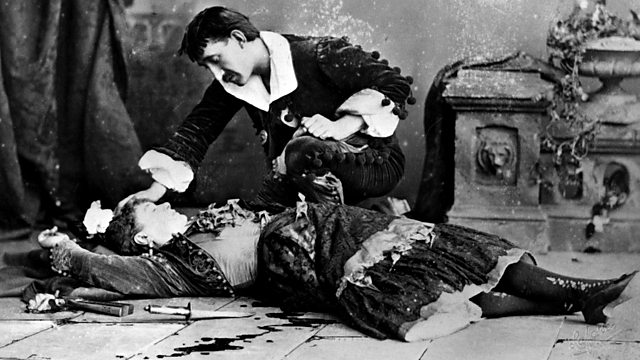
Episode 1
Donald Macleod explores how verismo first came about in the 1870s, a period when composers were keen to break away from the operatic conventions of the past.
When it comes to Italian opera, the term verismo promises tales of high drama, love, lust, violence and death. From the anguish of Elisabeth in Verdi's Don Carlos, to the ghastly murder that draws the curtains on Puccini's Il tabarro, this is a week of passion, ecstasy and heartbreaking tragedy, realised in sumptuous musical technicolour by the grand masters of the genre. There's a feast of music by Puccini, Leoncavallo and Mascagni, along with a series of lesser known but equally colourful characters including Cilea, made famous by Enrico Caruso, Ponchielli, probably best known for the comedic realisation of Dance of the Hours in Disney's Fantasia and Catalani, whose best known aria was used in the French film "Diva". There's even an aria from an alternative Bohème, written by Leoncavallo at the same time as Puccini's big hit.
But it's not as easy as it might seem to work out why these composers get lumped together. Musically speaking at least, verismo is a term that's probably got more exceptions than rules, inviting debate to the point where some academics have stated it should be "handled with great care.if at all"!
Happily ignoring that particular advice, as part of the ���˿���'s opera season in 2010, the Italian opera authority Roger Parker joins Donald Macleod to map out the ways in which "verismo" can be applied to opera from Verdi to the twentieth century.
Monday's programme begins in the 1870s, in the aftermath of a newly unified Italy. Responding to the prevailing artistic restlessness, composers were keen to break away from the operatic conventions of the past and found inspiration in an avant-garde literary movement headed up by Giovanni Verga. It was against this backdrop that the grand old man of Italian opera, Verdi looked to Paris and grand opera, wishing to produce something new and distinctly modern. Soon enough a tide of younger composers rushed to follow in his wake.
Last on
More episodes
Previous
You are at the first episode
Next
Music Played
-
![]()
Giacomo Puccini
Tosca (Act 1) Ah Finalmente!
Performer: Maurizio Muraro (Angelotti), Antonio Pappano (conductor)
- EMI CDS5571732.
- 1.
-
![]()
Pietro Mascagni
Cavalleria rusticana: Mamma, quel vino è generoso
Performer: Luciano Pavarotti (Turiddu), Ida Bormida (Lucia), Julia Varady (Santuzza), National Philharmonic Orchestra, Gianandrea Gavazzeni (conductor)
- Decca 421 870-2.
- 7.
-
![]()
Giuseppe Verdi
Don Carlos (sung in French) Act V: C'est Elle!...J'avais fait un beau rêve …Au revoir da
Performer: Placido Domingo (Carlos), Katia Ricciarelli (Elisabeth), Ruggero Raimondi (Philippe), Nicolai Ghiaurov (Inquisitor), Chorus and Orchestra of La Scala, Milan, Claudio Abbado (conductor)
- DG 415 316-2.
-
![]()
Arrigo Boito
Mefistofele: Act 3 - The Death of Margherita
Performer: Luciano Pavarotti (Faust), Nicolai Ghiaurov (Mefistofele), London Opera Chorus, National Philharmonic Orchestra, Oliviero de Fabritiis (conductor)
- Decca 4101752.
-
![]()
Amilcare Ponchielli
La Gioconda - Libretto Boito Act 3, Scene 2: Vieni! - Lasciami! ohimè!
Performer: Robert Merrill, (bass), Oralia Dominguez (mezzo soprano), Carlo Berzonzi (tenor) Nicola Ghiuselev (bass), Orchestra and Chorus of the Academy of Santa Cecilia, Rome, Lamberto Gardelli (conductor)
- Decca 430 042-2.
Broadcasts
- Mon 17 May 2010 12:00���˿��� Radio 3
- Mon 17 May 2010 22:00���˿��� Radio 3
Beethoven Unleashed – the box set
What was really wrong with Beethoven?
Composers A to Z
Who knew? Five eye-opening stories from Composer of the Week
Five reasons why we love Parry's Jerusalem
What is the strange power of Jerusalem which makes strong men weep?
A man out of time – why Parry's music and ideas were at odds with his image...
The composer of Jerusalem was very far from the conservative figure his image suggests.
Composer Help Page
Find resources and contacts for composers from within the classical music industry.





